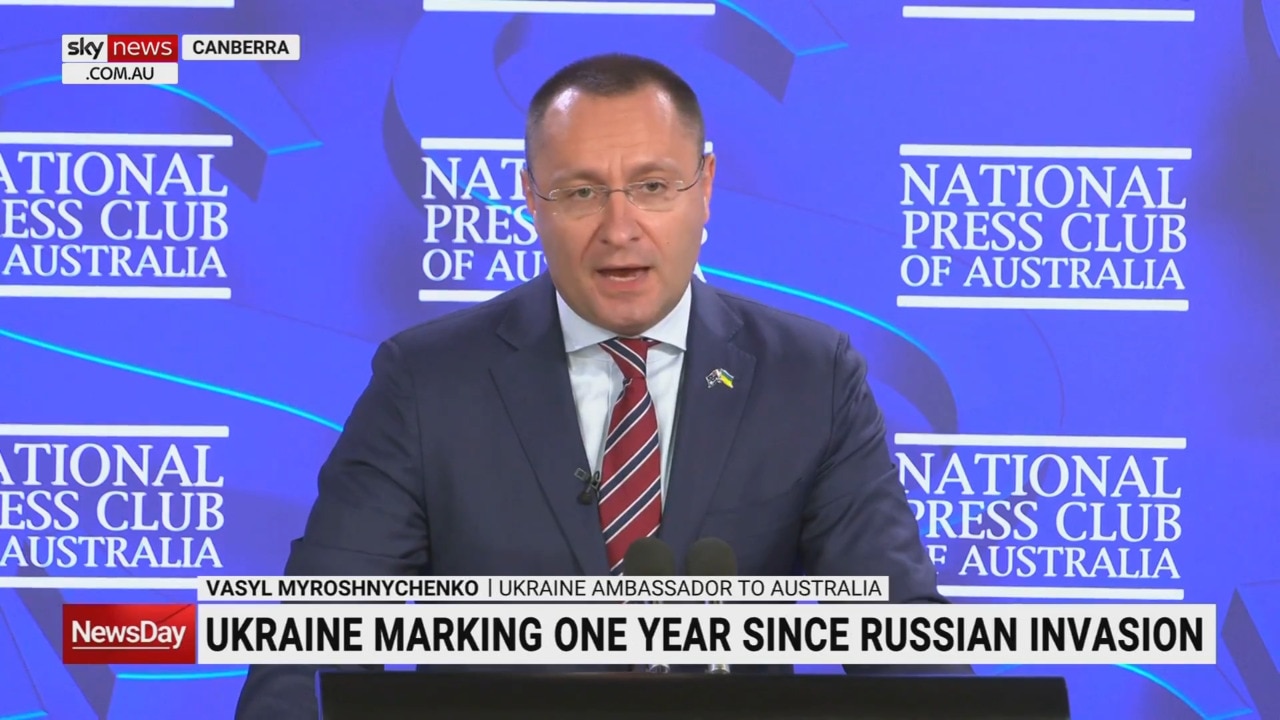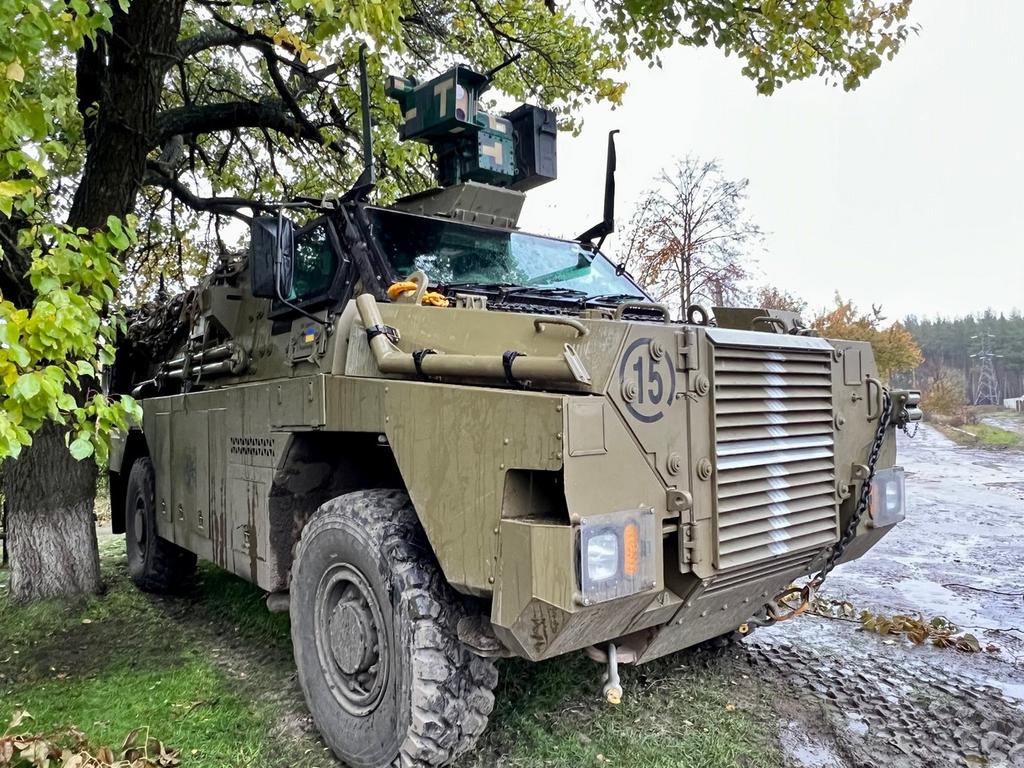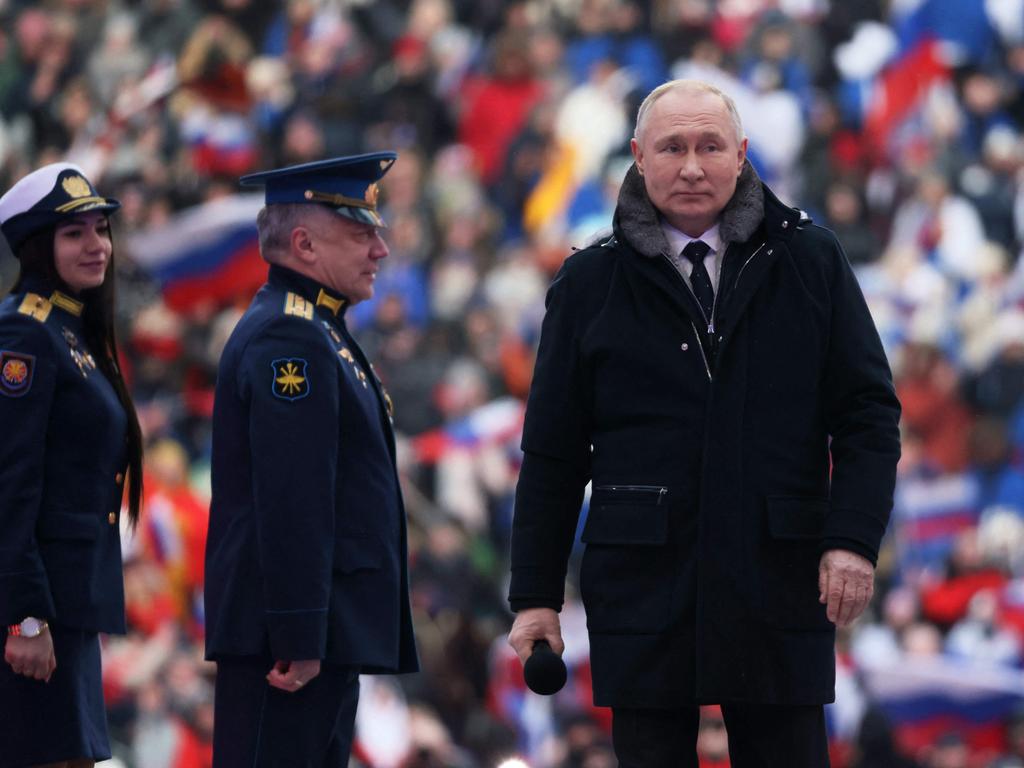Ukraine Deputy Foreign Minister Emine Dzhaparova forecasts more terror — and defiance
Emine Dzhaparova says Australia is holding together an international collective security system for Ukraine.

As the grinding Russian war against Ukraine enters its second year, Joe Biden has promised the West will stand with Kyiv for as long as it takes to secure Ukrainian freedom. Russia’s Vladimir Putin, in contrast, has preached a series of rambling, paranoid, nationalist sermons accusing the West of abandoning civilisation and embracing depravity, accusing NATO of attacking Russia with German tanks and accusing Ukraine of being a neo-Nazi, fascist state.
Putin made it clear he’s gearing his nation up for prolonged war. This struggle will continue for months, if not years. He thinks the West will lose interest, lose its nerve, betray its Ukrainian allies eventually. Then the sheer weight of Russian numbers will finally crush Ukraine.
Biden visited Ukraine on Monday and stood with Volodymyr Zelensky. Though the Russians had advance notice of the visit, it took some physical courage on Biden’s part. He promised more long-range missiles for Kyiv, so they can hit Russian supply lines within Ukraine. He is still resisting providing advanced fighter jets but, as the struggle wears on, the case for Ukraine getting more military aid becomes stronger.
Putin suspended Russia’s participation in the New START agreement, the last vestige of nuclear arms control. There is genuine nuclear risk. If Putin becomes desperate, anything is possible, including tactical nuclear weapons.
Matching Biden’s visit to Ukraine, China’s foreign policy boss and State Councillor, Wang Yi, visited Moscow in a show of solidarity with Russia. This came days after US Secretary of State Antony Blinken warned Beijing might be about to supply lethal weaponry to Russia. Blinken told Beijing such a move would have severe consequences for China’s relationship with the US.
Putin hopes not only that the West will lose resolve but that Ukraine will finally reach exhaustion and break. Ukraine’s morale has been sustained by its astonishing president, Zelensky.

Not many neo-Nazi states are led by Jewish comedians. Cometh the hour, cometh the man. Zelensky’s sure grasp of the moral enormity of his nation’s struggle, and the need for both defiance and hope, puts him in a class of one among leaders today.
He’s not the only Ukrainian who believes Ukraine will not buckle. This week I had a long Zoom conversation with Ukraine’s First Deputy Foreign Minister, Emine Dzhaparova. She forecasts that Russia will continue in coming weeks to attack Ukraine’s civilian infrastructure.
“Just go back to what they’ve been doing for a year,” she told me.
“The majority of Russian attacks are aimed at civilian infrastructure, power supplies and equipment, or hospitals, schools, apartments. This is a deliberate policy. We intercepted communications to their soldiers that it is Russian policy to kill civilians.”
She speaks with urgency and passion: “Their methodology is to paralyse people with fear. Their main tactic is fear. The essence of everything they do is fear, projecting that fear on to people. They hoped to weaken Ukraine because our winter is very severe and they left people without water and electricity. In the high apartment buildings you had 20-storey walks for water.
“What I found most amazing is that Ukrainian people were not complaining. We labelled these our health walks. We started keeping water in bottles to flush the toilet. The best present you can give anyone is a candle.”

She says Ukraine will endure: “We cannot afford to be exhausted. Can you be tired of protecting your children, your home, can you be tired of protecting your life?
“Almost all my men friends, they joined the Ukrainian Army. These are the best people, people with two or three higher degrees. The morale of the Ukrainian people, and the Ukrainian Army, is super high because we know what we’re fighting for. Putin questions us as a people, questions our statehood, our language. Russia’s goal is to turn us into a puppet state.
“We know what we’re fighting for. We’re fighting for our independence, our freedom. Russian soldiers, they are fighting for these perverted, chauvinistic ideas of Putin’s. You see the intercepted communications of the Russian soldiers, they are really demoralised. Our goal right now is survival.
“This is the struggle of the whole nation. The next step will be revival, after the war, when we can reconstruct our infrastructure, our mental health, everything. And then finally arrival, to a democratic, free, open society where Jews, Tatars, all Ukrainians can manifest their dignity, live with dignity. We want to be part of this European neighbourhood.”
Dzhaparova isn’t just spouting cliches when she talks of a multiracial Ukraine with religious and ethnic diversity. She is a Muslim, a member of the Tatar minority recognised as the indigenous people of Crimea.

The Crimean Tatars’ history is complex, long and bloody. Dzhaparova’s story, and her family’s, embodies the contradictions of modern Russia, and Ukraine. Russia first conquered Crimea in 1783 under Catherine the Great. “Catherine began the Russification of Crimea,” Dzhaparova says, “and Tatars fled to Bulgaria, Romania, Turkiye. Within 100 years of annexation a third of the indigenous population of Crimea had fled the country. Then in 1944 Stalin expelled every single Tatar Crimean under the pretext that they had collaborated with Nazi Germany. But he expelled women and children and seniors because all the men were fighting with the Red Army. Every second Crimean Tatar died.”
The story she tells of the Crimean Tatars is little known, and just one of countless genocidal tragedies encompassed by 20th-century communism, a creed once so fashionable among the bien pensants of the West. Until Joseph Stalin’s death in 1953, the Tatars weren’t allowed to leave the places of exile they were resettled to. Many died in these harsh resettlements. After Stalin’s death, the Tatars were allowed to travel but not to return to Crimea. Stalin, in what Dzhaparova labels a war crime, purposefully changed the ethnic composition of Crimea to make it Russian: “As long as we Tatars have our physical existence, Russia will not be able to fully sell the myth about Crimea being the sacred land of Russia. Crimea is born out of many different peoples.”
Then in 2014, when Putin took control of Crimea again, this caused Crimean Tatars to “flash back” to past traumas. Tatars organised demonstrations against Russian rule, she says, so many are political prisoners today.
Dzhaparova’s mother was a dentist, her father a doctor. They were so devoted to their Crimean identity that, even before the fall of communism, they returned. But they weren’t allowed to work as medical professionals and the authorities harassed landlords who let them rent a home. When communism collapsed, tens of thousands of Tatars came back to Crimea from their exile homes in central Asia and other parts of Russia. Dzhaparova went to school in Crimea, then university in Kyiv. She began her career as a junior diplomat but left to have children and became a TV presenter: “I never expected to become a journalist, but then when I was doing it, it felt like I was doing it forever.” She switched at times between Kyiv and Crimea and still lived in Crimea for a few months after the Russian invasion of Ukraine began nine years ago.

Eventually she and her husband made a high-tension relocation to Kyiv, going back once with her newborn second child so the family could meet their newest granddaughter. She misses her family home in Crimea but now doesn’t think she can go back until the Russian government leaves Crimea. “The first thing I felt when I crossed the administrative line in Kherson was ah, a physical sense of freedom. I could feel freedom on my skin, I could breathe freely.”
Does she really think Crimea will ever be free of Russian rule? “It’s possible, but the only way we can manage Russia is to speak its language. Russia understands only the language of power. When they occupied Crimea in 2014 we still had the G7 and Western leaders trying to appease Putin and his appetites. Crimea and the Donbas were for Putin the same as the Sudetenland and Austria were for (Adolf) Hitler.
“The nature of aggression is always the same. If it’s not stopped it just becomes bigger. We see the results now of a failure to give a proper response to Putin in 2014. If the war is not stopped here in Ukraine it will become bigger, because the appetite of Putin will always grow.
“We will fight for Crimea. Crimea is Ukraine. It’s not just our slogan. Ukraine will restore its territorial integrity and sovereignty. We all have to understand, until Ukraine’s territorial integrity is restored, including with Crimea, nobody can feel safe.”
She believes Ukraine’s struggle is a war for the chance of collective security: “There is a serious crisis in collective security. Russia is a member of the United Nations Security Council permanent five. It wields a veto. The P5 is meant to guarantee security, but this system gets into trouble when the P5 member itself becomes the troublemaker, when a nuclear power becomes a troublemaker. When the bigger attacks the smaller, no one can be secure.”

She thinks that Australia, in supporting Ukraine, is holding together an international collective security system: “We really feel Australia is very close to our hearts and our people. We really feel this Australian support. Australia is our greatest contributor outside NATO, especially when it comes to military support. Let’s be frank, our biggest need is weapons. It’s weapons, weapons, weapons. The war is exhausting these supplies.
“The Bushmasters have already become a true symbol of Australia’s support. We welcome the recent joint Australian-French announcement about supplying ammunition to us. We welcome Australia’s participation in training the Ukrainian Army in Britain, it’s something we need. We hope Australia won’t become exhausted because really it’s our common goal: collective security, freedom, democracy – it’s about our joint and common responsibility.”
She believes Putin underestimated the solidarity and determination of the West but that he was misled into this by the weakness with which the West dealt with him in the past: “The West should draw conclusions, learn lessons, get stronger than it was.” On that score, Dzhaparova is bitterly disappointed that Russian athletes will be allowed to participate in the Olympic Games as neutrals: “With deep regret we learnt about the resolution of the International Olympic Committee allowing Russian and Belorussian sportsmen to participate in international competitions. While Russia kills and terrorises, representatives of the terrorist state have no place at sports and Olympic competitions.
“It cannot be covered up with some pretended neutrality or a white flag. Because Russia is now a country that stains everything with blood – even the white flag.”
All nations participating in the Ukraine war, even indirectly, and many that are trying not to participate, are changed by it.
Putin surely wishes his military was winning more than it is but, as others have observed, in some ways the war is helping him shape the Russia he wants. Dzhaparova believes most Russians today support Putin’s military actions. The conflict has enabled Putin’s regime to bathe Russia in a sea of ultra-nationalist propaganda and paranoia, to lurch to Stalinist control, to license private militias loyal to Putin. Though he has often seemed wooden at public functions, Putin revelled in the giant rally he held the day after his long address to the nation.
Russia has a long, dark infatuation with anti-Western paranoia. Putin can pour his dreams of a new Russian empire into a bubbling stew of ethnic, nationalist and even religious prejudice.
Every nation is affected by this conflict. Between the war in Ukraine, Beijing’s massive military build-up, Iran edging closer to a nuclear weapon, the close co-operation between Moscow, Beijing and Tehran, plus the relentless missile launches and nuclear expansion of North Korea, the security situation has not looked this alarming for decades. More than 40 nations increased their defence spending in the past year. Anthony Albanese shouldn’t be criticised over foreshadowed military expenditure increases. We are already behind the curve in providing our own defence.

Biden has found his groove as a strategic leader, at least in this conflict. It’s some Republicans on the MAGA right who look scatty, with their deranged previous affection for Putin and contemptible idea that sacrificing Ukraine would have no consequences elsewhere, not to mention the inherent betrayal of such a dereliction.
No country, of course, will change more than Ukraine. One day there will have to be some kind of negotiated peace and the rebuilding task in Ukraine will be enormous. Dzhaparova recognises that after this transcendent sacrifice, if they get the chance, her compatriots must build a new kind of Ukraine: “Our government and parliament are already doing everything possible to maximise the transparency of using funds, to increase Ukraine’s investment attractiveness. I want to assure you, we do not tolerate corruption at all. Our victory on the battlefield against the aggressor is impossible without reforms. These are absolutely interconnected.”
Ukraine’s tragedy is shaping the world. For all its terror and pity, its outcome is still intensely unpredictable.




To join the conversation, please log in. Don't have an account? Register
Join the conversation, you are commenting as Logout